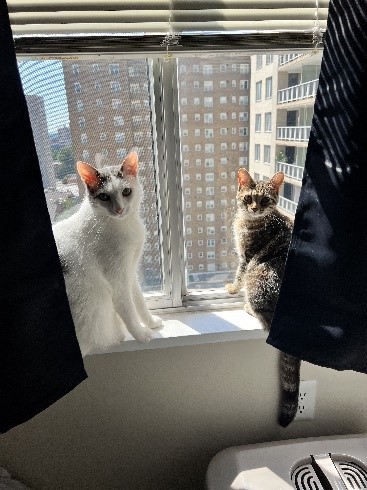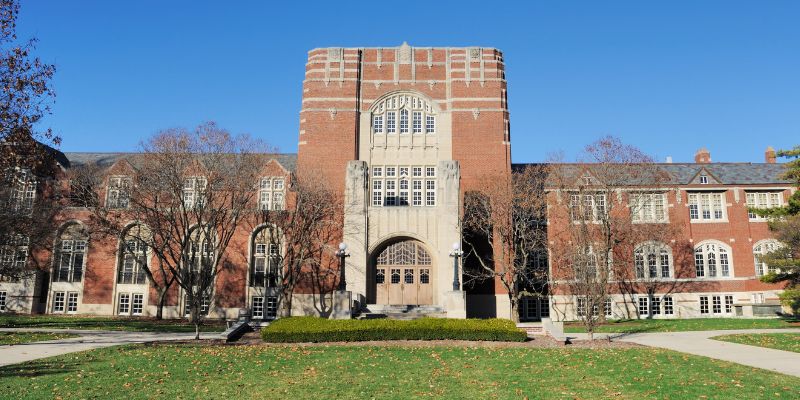| By Wolf Williams, Business Content Developer at Gale |
In August 2017, I left my home in Central Texas to start my higher education journey at the University of Iowa. Like many of my peers at the time, I had it all figured out. I planned to double major in economics and theatre arts, complete my degree plan with full honors in three years, work a part-time job, get the lead role in several plays or musicals, and continue my high school winning streak by getting straight As through graduation while taking the maximum credit hours possible.
This plan was going swimmingly for about six days. By that point, I had already missed the mandatory honors orientation, performed an embarrassingly underprepared rendition of a monologue from Death of a Salesman for a general audition, and was about to learn from my academic advisor that it was physically impossible to graduate with two vastly different majors in three years.
In my second semester, I got the first B of my entire educational career. I took this letter grade as a sign that something had to change. When I returned from summer break in 2018, I enrolled solely in business classes and finally identified my problem. By taking the maximum credit hours every semester, I had set myself up to do a lot of studying that simply wasn’t happening. I would set aside time to study, but it was in my cozy dorm. It became clear that I needed to leave the comfort of my living space to get things done.
To the Library(ies)
Fortunately, the home of the Hawkeyes boasts several libraries that were set up to support any type of academic work. I spent most of my time in the main library, which was centrally located and crucially offered fresh food and coffee to accommodate longer study sessions. There, I got used to running through flashcards on the macroeconomic effects of rising interest rates, conquering sleep-inducing practice accounting quizzes, and managing copious management lecture notes.
However, while the main library was a good start, it wasn’t a one-size-fits-all location for every situation. For example, I would schedule group project meetings in the Marvin A. Pomerantz Business Library since it resides in the same building as my group’s classes. It sits on the 4th floor of the Tippie College of Business and hosts more computers than books. This structure made the business library perfect for data analysis, mapping out supply chains, and collaborating on shared documents alongside group project members.
Speaking of group projects, I remember a specific presentation that I had to prepare evaluating Mountain Dew and the soft drink industry. Utilizing library resources, I conducted market research comparing the fluorescent green beverage’s market share to its competitors. The business library’s access to financial data and industry analyses helped me develop a fictional Mountain Dew health drink product once this noticeable gap in the market became apparent.
Access to case studies provided another reason to brave the Iowa winter and head to the business library. I evaluated all sorts of hypothetical situations like managing HR conundrums in the retail industry or implementing sustainability measures in a multinational company. I didn’t know it at the time, but managing these fake problems within a group prepared me to reach actual solutions with my team in the real workplace.
I would like to punctuate my time as an undergraduate business student by saying that I picked up the slack, never got a grade below 90% again, and lived happily ever after. This was not entirely the case. My grades were middling most of the time and I continued to struggle through some of the more difficult subjects like global economics and econometrics.
What I did learn, though, was how to be imperfect and how to live outside of my comfort zone. I didn’t always want to go to the library and study, but I had fostered the discipline to get out there and get things done. I started to appreciate collaborating with others instead of avoiding it altogether, and I found a sense of camaraderie when my study buddies and I fell short of our perpetually high expectations.
In May 2020, I graduated. The last half of my final semester was completely virtual due to COVID-19, I lost my job filming events for the university (good luck filming events when there are no events), and I was entering the labor market during one of the worst economic crises in recent memory. Ironically, I was equipped with the knowledge to realize just how bad a 13% unemployment rate really was.
A Byte of Knowledge
After trying and failing to land a full-time job, I decided to apply for the MS economics program at Purdue University. Following a lengthy application process and an online interview, I got in. From that point on, I would study and work virtually.
While I couldn’t go to any Purdue libraries in person, the lessons I had learned from my experience at the University of Iowa seemed to carry over. Now that leaving the house wasn’t a viable option, I had to double my efforts to act with discipline, find a sense of community, and use all available online resources from the confines of my one-bedroom apartment in St. Louis.
Thankfully, Purdue is known for its online programs, and its online library resources lived up to the hype. I had open access to some of the largest databases in the world to source economic research, gather data for statistical analysis, and monitor the latest market news. Access to these databases ensured that I was always caught up on current economic conditions, which made quick work of discussion posts centered on current events.
I had another excuse to log on to the library website when the Purdue University Research Center in Economics (PURCE) hired me to start writing summaries of economic research for a general audience. My workflow included sourcing economic research from the library, weeding through the economics jargon, and then relaying the information back in plain English to make it accessible to anyone.
Using a virtual library was a big change from exploring the different spaces in real life, but it was no less useful. The library, be it online or in person, was integral to my academic success as a business student. If I had to give one piece of advice to business students, I would tell them to use all the resources at their disposal.
Being a business student in the digital age requires access to research, data, and business news that would be impossible to acquire on your own. Libraries are resources that exist for the benefit of students, researchers, and the public. Whether your books are in print or eBook format, or your education is analog or digital, the library provides essential services that are uniquely beneficial for all who choose to visit.

About the Author
Wolf Williams is a full-time content developer on the Business Content team and the Global Academic Product group at Gale. He is also an economics communications consultant for Purdue University. He lives in St. Louis, Missouri, with his partner and their two cats named Rainy and Sunny.




